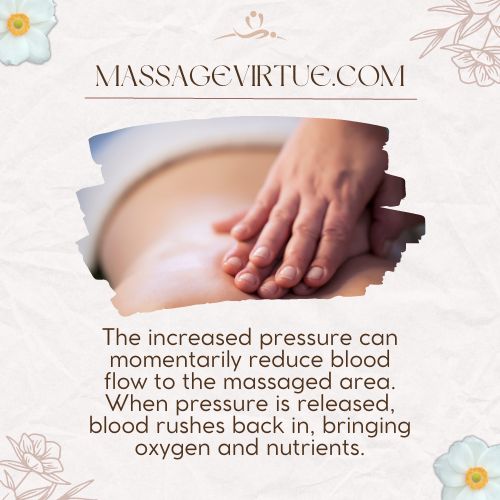If you’ve ever considered getting a deep tissue massage or have experienced one that left you feeling sore and wondering why it hurt, you’re not alone.
Deep tissue massage is renowned for its therapeutic benefits, but it can also be a bit discomforting for some.
In this article, we’ll dive deep into the world of deep tissue massage, exploring why it can sometimes hurt, its benefits, potential risks, and whether it’s the right choice for you.
Why Deep Tissue Massage Hurts?
Deep tissue massage can hurt because it uses strong pressure to reach deep muscles and release tension. This pressure can be uncomfortable, especially if you have muscle knots or tightness.

It may also temporarily reduce blood flow, which can cause some discomfort.
However, the temporary discomfort is often worth it for the pain relief, better flexibility, and muscle relaxation it brings.
If it hurts too much, talk to your therapist to adjust the pressure to your comfort level.
5 Reasons Why Do Deep Tissue Massages Hurt?
Deep tissue massage can make you feel uncomfortable for a few reasons. Let’s explore them:
1. Intense Pressure
Unlike a gentle massage, deep tissue massage employs strong, sustained pressure.
This pressure targets deep-seated muscle knots and trigger points, which can be tender and painful to touch.
2. Breaking Adhesions
The pressure applied during deep tissue massage can help break down adhesions or bands of rigid tissue that can restrict muscle movement.
While this is beneficial in the long run, it can be momentarily painful.
3. Releasing Toxins
As deep tissue massage works on releasing muscle tension, it can also release built-up toxins in the muscles. This detoxification process might cause temporary discomfort.
4. Muscle Realignment
Deep tissue massage can realign muscles that have been out of place due to tension or injury. This adjustment can be initially uncomfortable as your body adapts to its new alignment.
5. Blood Flow and Oxygen
The increased pressure can momentarily reduce blood flow to the massaged area.

When pressure is released, blood rushes back in, bringing oxygen and nutrients. This rush can be intense and cause discomfort.
The Benefits of Deep Tissue Massage
While deep tissue massage sessions can be uncomfortable for some, they offer a wide range of advantages, such as:
- Alleviating chronic pain and muscle tension
- Enhancing your range of motion and flexibility
- Decreasing inflammation and swelling
- Boosting blood circulation
- Lowering the risk of injuries
- Easing stress and anxiety
- Enhancing your overall sense of well-being
What to Expect During a Deep Tissue Massage Session?
During a deep tissue massage, the massage therapist will use different methods to reach deep muscles. They might use their elbows, forearms, or fingers to put slow and deep pressure on the areas that need it.
You might feel a bit uncomfortable or like there’s pressure during the massage, but it shouldn’t hurt.
It’s important to tell your massage therapist if anything doesn’t feel right.
After the massage, you might feel a little sore or stiff in the areas they worked on. Don’t worry; this is normal and should disappear in a day or two.
Potential Risks and Side Effects
While deep tissue massage offers numerous benefits, it’s essential to be aware of potential risks and side effects:
| Risks | Explanation |
| Soreness | You might feel sore right after a deep tissue massage, but it usually goes away in a day or two. |
| Bruising | Bruising is rare but can happen due to strong pressure. Talk to your therapist about your comfort level to avoid it. |
| Pain During the Massage | Some discomfort or pain can occur during the massage, especially in tense areas. Communication with your therapist helps adjust the pressure for your comfort. |
Contraindications or Precautions
Before booking a deep tissue massage, it’s vital to consider any contraindications or precautions:
Contraindications
- Recent Surgery: If you’ve had surgery recently, consult your doctor before getting a deep tissue massage.
- Pregnancy: Special prenatal massage techniques are required during pregnancy, so inform your therapist if you are expecting.
- Certain Medical Conditions: If you have certain medical conditions like blood clots, osteoporosis, or cancer, consult your healthcare provider before scheduling a deep tissue massage.
Precautions
- Communicate: Always communicate openly with your massage therapist about any discomfort or concerns during the session.
- Hydration: Drink plenty of water before and after your massage to help flush out toxins released during the massage.
- Rest: Plan some relaxation time after your deep tissue massage to allow your body to recover fully.
Is Deep Tissue Massage Right for You?
The decision to undergo a deep tissue massage should be based on your individual needs and preferences.
If you seek targeted pain relief, enhanced flexibility, and improved overall well-being, deep tissue massage may be an excellent choice for you.
However, if you have specific health concerns or a low pain tolerance, you may want to consider gentler massage alternatives.
Conclusion
In conclusion, deep tissue massage can hurt temporarily due to its intense pressure and the processes it triggers in your muscles.
Nevertheless, the benefits it offers can make it a worthwhile choice for many individuals.
Always communicate openly with your massage therapist, consider any contraindications, and weigh the pros and cons to determine if deep tissue massage aligns with your wellness goals.
Remember, the initial discomfort can lead to long-lasting relief and improved muscle health.
FAQs
Are Deep Tissue Massages Supposed to Hurt?
No, deep tissue massages are not supposed to hurt, but they might feel a bit uncomfortable at times. The pressure should be intense but not painful.
It’s important to communicate with your therapist to adjust the pressure to your comfort level.
Why Does It Hurt During a Deep Tissue Massage?
It can hurt during a deep tissue massage because of the intense pressure to reach deep muscles and release tension.
This pressure may temporarily cause discomfort, but it’s usually beneficial in the long run.
What Happens to Your Body When You Get a Deep Tissue Massage?
During a deep tissue massage, your body experiences increased blood flow, muscle tension relief, and relaxation.
It can also break down muscle knots and scar tissue, improving your overall muscle health.
Is It Normal to Cry During a Deep Tissue Massage?
Crying during a deep tissue massage is not common, but it can happen if you have strong emotional reactions or release tension during the session.
It’s essential to communicate with your therapist if you feel overwhelmed. They can adjust the massage to make you more comfortable.


